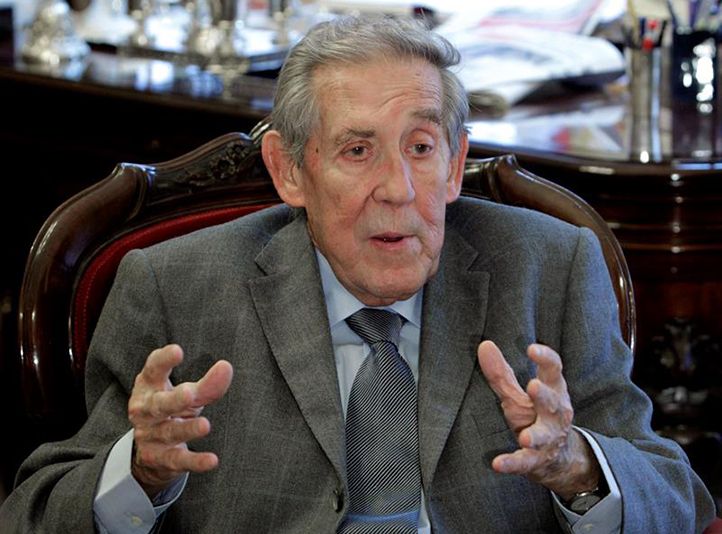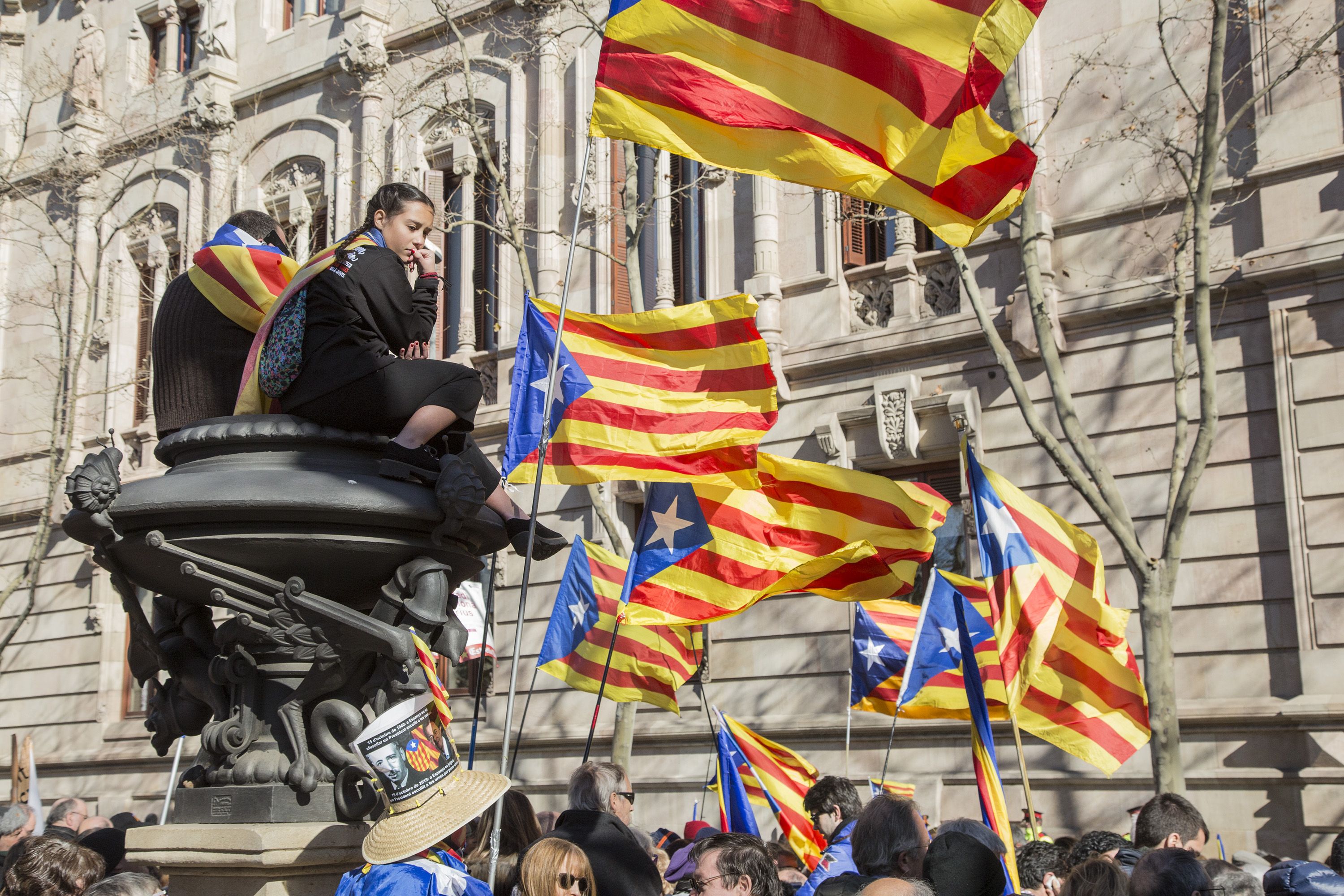Of course they are not a multitude, but they are there. They are Spanish jurists and political scientists who since the beginning of the independence process in Catalonia have defended with different accents, nuances and procedures the call for a referendum or plebiscite to determine the “true” will of the citizens of Catalonia on the issue of independence. And so provide a political way out.
The position of these experts contrasts with the relentless policy of judicialisation of the process that this year has sat a President of the Catalan Generalitat government, Artur Mas, and two of his Ministers, Joana Ortega and Irene Rigau at the defendants’ bench for promoting the Participatory process or alternative non-binding plebiscite on November 9, 2014. An unprecedented situation in Spanish democracy which marks a point of no return in the political and institutional conflict between Catalonia and Spain.
But what is more, they question the negationist thesis maintained by the Partido Popular government entirely: firstly the government says the referendum or plebiscite is impossible in the current Spanish legal framework, and secondly that it would not solve the “problem”, because it would only lead to disruption and division amongst the Catalans, and between them and the rest of the citizens of Spain. In other words, Spanish Prime Minister Mariano Rajoy’s “I cannot, and I do not want to” or former PM José María Aznar’s thesis that Catalonia would break up before Spain.
Below are some of the most significant positions in favour of a referendum by prominent jurists and experts from Spain. None of them are at all suspect of being biased in favour of the independence of Catalonia.
Francisco Rubio-Llorente
Francisco Rubio-Llorente (Berlanga, 1930–Madrid, 2016) was Vice President of the Constitutional Court, President of the Council of State between 2004 and 2012 —where he prepared a report on the reform of the Constitution on behalf of then Prime Minister José-Luis Rodríguez-Zapatero— and a professor at the Complutense University of Madrid. He was amongst the first to reflect on the hypothesis of a referendum for Catalonia as a solution to the contention raised by the Catalan sovereignty issue.
“If a territorialised minority, i.e. one that is not dispersed throughout the territory of the State —as is the case of certain minorities in Eastern Europe— but is concentrated in a specific area, an administrative demarcation, and with the size and resources necessary to constitute a state, expresses the wish for independence, democratic principle prevents opposition to this will using formal obstacles that may be suppressed.” Thus Rubio-Llorente stated in an article in newspaper El País on October 8, 2012, titled unequivocally “A referendum for Catalonia.” Artur Mas had just called snap elections for the first time after the first major demonstration for independence, and the refusal of Mariano Rajoy to negotiate a fiscal agreement.

Francisco Rubio-Llorente / EFE
If a territorialised minority, i.e. one that is not dispersed throughout the territory of the State —as is the case of certain minorities in Eastern Europe— but is concentrated in a specific area, an administrative demarcation, and with the size and resources necessary to constitute a state, expresses the wish for independence, democratic principle prevents opposition to this will using formal obstacles that may be suppressed."
The prestigious jurist said that “If the Constitution prevents it, it will be necessary to reform it, but before reaching that point, it will be necessary to sound out the existence and solidity of this alledged will [for independence].” At this point, he cited the opinion of 1999 of the Supreme Court of Canada on the legitimacy of a referendum on independence in the French-speaking province of Quebec, which had been held on two occasions, adding “The Generalitat government of Catalonia cannot call a referendum, but nothing prevents it from requesting one and even taking part in organising it.” Rubio-Llorente attributed the calling of the plebiscite to the King, at the proposal of the Prime Minister of the Spanish Government with prior authorisation from the Cortes or Parliament of Spain.
José María Ruiz Soroa
“Secession is possible, otherwise our democracy would be incomplete” said José-María Ruiz-Soroa in an interview with the Madrid digital newspaper páginasDigital.es. Born in Bilbao in 1947, he holds a PhD in Law and has a degree in Political Science, he is a retired professor at the University of the Basque Country and a lawyer. In his opinion, the Constitution is modifiable in all its contents, except those referring to the fundamental rights of people, for which there is no territorial scope in Spain, he points out. The path to modification, he argues, is article 168 of the Constitution itself, the “severe reform procedure” which includes a referendum throughout the State and at the initiative of the State itself.
José María Ruiz Soroa / NAUCHER GLOBAL
Secession is possible, otherwise our democracy would be incomplete"
“It is necessary to admit that if in a territory or region it is shown that there is a clear, firm and stable desire to secede, the State should of its own accord initiate the process to modify the Spanish Constitution in this regard,” he says. Before reaching that point however, Ruiz-Soroa maintains, as did Rubio-Llorente, that it is necessary to confirm “in a plebiscite whether there is a clear will of the majority [for independence].” The State can carry out this verification, he suggests, by means of article 92 of the Constitution, precisely that which the Spanish Congress denied the representatives of the Parliament of Catalonia who requested an agreed non-binding referendum in 2014.
Ignacio Sánchez-Cuenca
“It is absurd that the possibility of raising the question of a referendum on secession of a territory should have been turned into a political taboo.” Thus begins the article “Ideas for an accorded Catalan referendum” by Ignacio Sánchez-Cuenca and published in the CTXT supplement of the Público digital newspaper on January 6, 2016. Sánchez-Cuenca (Madrid, 1966) is a sociologist, philosopher and professor of Political Science. He has taught at the Complutense and Carlos III universities in Madrid, at Pompeu Fabra in Barcelona and at Yale in the US. Sánchez-Cuenca notes that “the referendum is called for by an ample majority in Catalonia” —as shown by survey after survey— and he does not doubt that “it is the best tool available to ascertain the support for the pro-independence project.” He even proposes a possible question: “Do you want Catalonia to be a state of its own, independent from Spain?” And the possible answers: “Yes” or “No.”
Ignacio Sánchez-Cuenca / LA SEXTA
if a broad and clear majority of Catalans want to become independent, it would be absurd to force them to remain in Spain against their will"
“Neither Catalonia nor any other Spanish region has a unilateral right to secession. However, if a broad and clear majority of Catalans want to become independent, it would be absurd to force them to remain in Spain against their will”, he says. Sánchez-Cuenca is in favour of a federal model for Spain that recognises pluri-nationality to “deactivate the demand for independence.” However, he points out that this model should be ratified by a referendum in the whole of Spain and in the case that Catalonia were against it “there would be no other choice than proposing a future referendum on independence” as “a last option.”
Javier Pérez Royo
A professor of Constitutional Law at the University of Seville, where he was born in 1944, Javier Pérez-Royo was one of the few jurists who, from the perspective of an open and pluralistic Spanish constitutionalism, differed radically from the ruling of the Constitutional Tribunal against the Catalan Statute of Autonomy of 2006 and warned of the effects for the entire Spanish constitutional system. Pérez-Royo refers to that decision of the high court, which he considers “dramatic” and the cause that most of Catalan society —and not just pro-independence activists— is now demanding a referendum, which he considers a capital change.
Javier Pérez Royo / Parlament d'Andalusia
The legally ordered political response of the 1978 Constitution was acceptable until 2010. It then ceased to be so. A new political response is required. A constituent response."
In an article in CTXT titled “Referendum in Catalonia” (November 2, 2016), the Andalusian jurist says: “The State has imposed a Statute [dismembered by the Constitutional Court] upon Catalonia without the consent of its citizens. The citizens are demanding back the voice that was taken for them.” “But now they are not demanding it as the last word [since the Statute had already been approved by them in a referendum], but rather as the first one, not as a destination but rather as a starting point. Not a referendum to approve the formula for integration in the State, but a referendum to decide whether or not they want to remain part of the State at all,” he adds.
The consequence is that, in Pérez-Royo’s eyes, the reform of the Constitution is no longer a solution: “The legally ordered political response of the 1978 Constitution was acceptable until 2010. It then ceased to be so. A new political response is required. A constituent response.”

